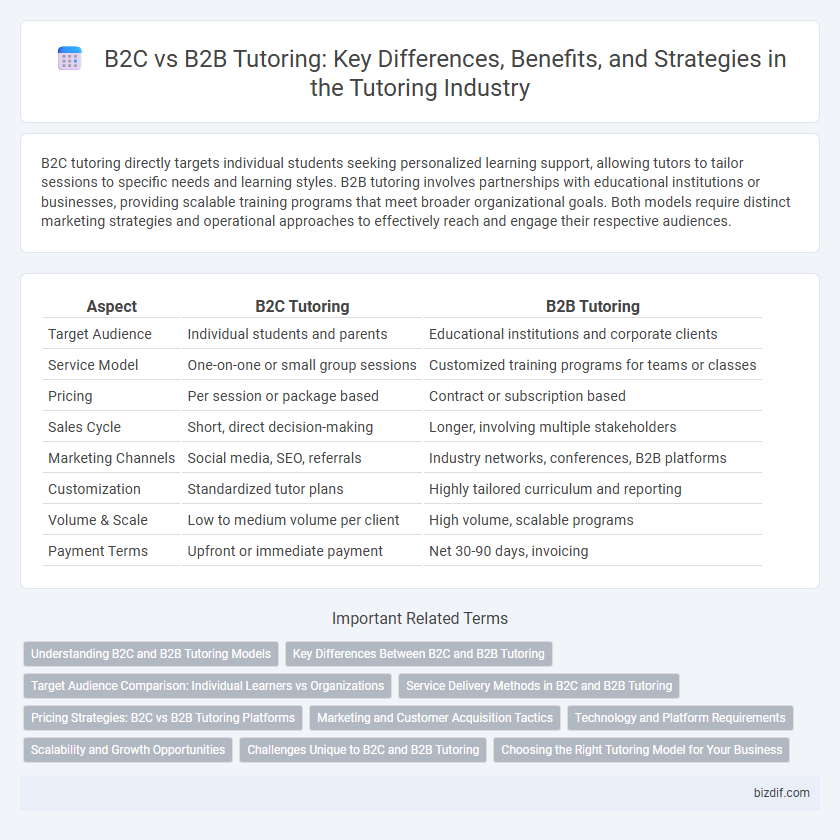B2C tutoring directly targets individual students seeking personalized learning support, allowing tutors to tailor sessions to specific needs and learning styles. B2B tutoring involves partnerships with educational institutions or businesses, providing scalable training programs that meet broader organizational goals. Both models require distinct marketing strategies and operational approaches to effectively reach and engage their respective audiences.
Table of Comparison
| Aspect | B2C Tutoring | B2B Tutoring |
|---|---|---|
| Target Audience | Individual students and parents | Educational institutions and corporate clients |
| Service Model | One-on-one or small group sessions | Customized training programs for teams or classes |
| Pricing | Per session or package based | Contract or subscription based |
| Sales Cycle | Short, direct decision-making | Longer, involving multiple stakeholders |
| Marketing Channels | Social media, SEO, referrals | Industry networks, conferences, B2B platforms |
| Customization | Standardized tutor plans | Highly tailored curriculum and reporting |
| Volume & Scale | Low to medium volume per client | High volume, scalable programs |
| Payment Terms | Upfront or immediate payment | Net 30-90 days, invoicing |
Understanding B2C and B2B Tutoring Models
B2C tutoring targets individual learners and families seeking personalized educational support, emphasizing tailored lesson plans and flexible scheduling to boost student performance. B2B tutoring involves partnerships with schools, educational institutions, or corporations aiming to provide scalable, curriculum-aligned training programs and professional development. Understanding these models helps optimize client engagement strategies by addressing distinct needs, such as direct consumer interaction in B2C versus institutional collaboration in B2B.
Key Differences Between B2C and B2B Tutoring
B2C tutoring involves direct interaction between tutors and individual students or parents, emphasizing personalized learning experiences and flexible scheduling. In contrast, B2B tutoring targets educational institutions or companies, focusing on scalable solutions, curriculum alignment, and bulk service agreements. Pricing models differ significantly; B2C often uses per-session fees, while B2B relies on long-term contracts with negotiated rates and performance metrics.
Target Audience Comparison: Individual Learners vs Organizations
B2C tutoring primarily targets individual learners seeking personalized academic support, language proficiency, or test preparation, emphasizing customized learning experiences and flexible scheduling. In contrast, B2B tutoring focuses on organizations such as schools, corporations, and educational institutions aiming to enhance employee skills or student outcomes through scalable training programs and bulk service agreements. Understanding these distinct target audiences enables tutoring providers to tailor their marketing strategies and service delivery effectively for maximum engagement and impact.
Service Delivery Methods in B2C and B2B Tutoring
B2C tutoring commonly employs personalized online platforms, one-on-one virtual sessions, and interactive mobile apps to cater directly to individual students' learning paces and preferences. B2B tutoring emphasizes scalable solutions such as bulk licensing of digital course materials, tailored corporate training modules, and partnership-driven learning management systems designed for employee skill development. Service delivery in B2C focuses on flexibility and customization for personal use, while B2B prioritizes integration, scalability, and consistency across organizations.
Pricing Strategies: B2C vs B2B Tutoring Platforms
B2C tutoring platforms typically implement competitive pricing strategies with flexible per-session rates to attract individual learners, often offering discounts and packages tailored to student budgets. In contrast, B2B tutoring platforms adopt value-based pricing models, charging bulk rates or subscription fees to educational institutions or corporations, emphasizing scalability and long-term contracts. Pricing optimization in B2B focuses on volume discounts and service customization, whereas B2C prioritizes affordability and session variety for consumer retention.
Marketing and Customer Acquisition Tactics
B2C tutoring marketing focuses on direct engagement through social media ads, search engine optimization, and targeted content to attract individual students and parents, leveraging emotional and academic achievement drivers. B2B tutoring strategies prioritize relationship building with schools, educational institutions, and corporate clients, emphasizing personalized outreach, case studies, and partnership proposals to secure bulk contracts or referral agreements. Customer acquisition in B2C relies on user reviews and trial sessions, while B2B depends on networking, industry events, and long-term trust development with decision-makers.
Technology and Platform Requirements
B2C tutoring platforms require user-friendly interfaces, real-time interactive tools, and scalable video conferencing features to engage individual learners effectively. B2B tutoring solutions demand robust enterprise integration, secure data management, and customizable dashboards to meet organizational training needs. Advanced analytics and automated scheduling systems are essential for both models to enhance user experience and operational efficiency.
Scalability and Growth Opportunities
B2C tutoring offers greater scalability through direct access to a large customer base of individual students, enabling rapid growth with lower acquisition costs and diverse revenue streams such as one-on-one sessions and subscription models. B2B tutoring focuses on institutional clients like schools and corporations, providing higher-value contracts and long-term partnerships but often involves slower onboarding and customization challenges. Companies investing in B2B tutoring can leverage enterprise-scale solutions for steady growth, while B2C models benefit from agile operations and digital platforms to expand market reach quickly.
Challenges Unique to B2C and B2B Tutoring
B2C tutoring faces challenges such as managing diverse individual learning needs, maintaining student engagement, and creating personalized study plans that align with each learner's goals. B2B tutoring requires navigating complex organizational structures, addressing multiple stakeholders' expectations, and delivering scalable solutions that meet corporate training standards. Both sectors demand specialized communication strategies to effectively tailor educational content and measure outcomes.
Choosing the Right Tutoring Model for Your Business
Choosing the right tutoring model for your business depends on your target audience and growth objectives, with B2C tutoring focusing on individual learners seeking personalized support and B2B tutoring catering to institutions or companies requiring scalable educational solutions. B2C models often emphasize customized lesson plans and flexible scheduling, while B2B models prioritize curriculum alignment, bulk contract negotiations, and consistent service delivery for large groups. Evaluating factors like market demand, operational complexity, and revenue potential helps optimize your tutoring service's strategic positioning in competitive education markets.
B2C Tutoring vs B2B Tutoring Infographic

 bizdif.com
bizdif.com